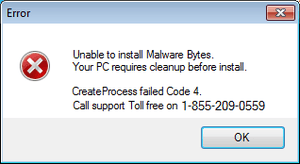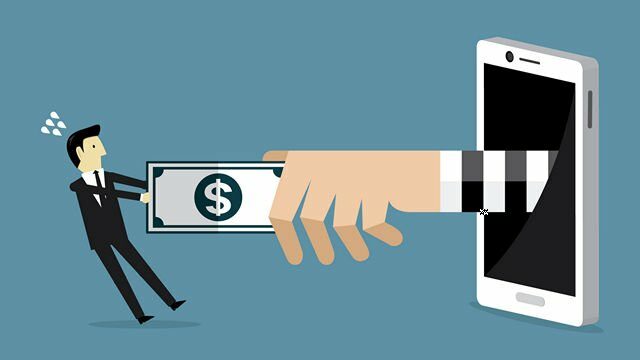1. You Didn't Initiate the Call
If you aren't aware of the problem and weren’t the one to place the phone call, that’s a major warning sign. The majority of malicious phone calls involve a scammer contacting you and posing as someone else. Whether it's Microsoft, Spark, or your bank, their hope is that you won’t double-check that they’re legitimate.
Be very suspicious of any unknown phone calls you receive, especially those that come from out-of-state or toll-free numbers. If you don’t recognize a caller, it’s best to let it go to voicemail. Someone who really needs to get hold of you will leave a message.
Of course, this doesn’t mean every call you place is guaranteed safe. When you initiate a call, make sure you have the right phone number. It’s possible to come across imitation websites that look official, but provide fake numbers to phony services.
We've helped many people who thought they were calling Dell, HP, or Microsoft but somehow ended up dialing scammers phone numbers because their computers are already hijacked and show ads for fake tech support services.

2. The Caller Paints an Extreme Scenario
People who carry out scams on the phone want you to drop your guard. This is why they try to shock you with extreme news - like your bank information is stolen and already in transit to scammers, your computer is going to explode, or your Internet access will be shut off completely.
But when you hear extreme statements like this, your natural reaction is probably to make the situation right as quickly as possible. And that’s why…
3. They Pressure You to Pay, Quickly
As we’ve seen, phone scammers want you to act without thinking critically. Once you’re scared from their story, they want to rip you off as soon as possible. They might ask for your credit card information in order to purchase a “security suite,” for example.
If you ask them what you’re really paying for, they’ll often fail to give a straight answer. If they never have a response to what you ask and instead deflect the question and speak in vague terms, you’re almost certainly talking to a scammer. Real companies are usually happy to give you answers or direct you to the right person.
The more time you spend on the phone with them, the more irritable and annoyed they become. Here is a good example to watch 🙂
Of course, you aren’t actually going to get anything for your money, so once you’re done with the transaction, they don’t have much use for you anymore.
As a general rule, you should never make a purchase on a phone call that you didn’t initiate. If you’re really not sure, don’t make any purchases on the current call. Hang up and call someone you trust to discuss it.
4. They Show You the Windows Event Viewer
Common Tech Support scams involve someone calling you and pretending to be from Microsoft or another computer company. They request remote access to your computer via an app like TeamViewer and proceed to show you "signs" that your computer is infected.
Actual tech support companies (including us!) use exactly the same apps and often use Event Viewer for troubleshooting as well. It is useful for diagnosing actual issues on a case-by-case basis, such as troubleshooting blue screens or app crashes.
The fraudster points to these the various Error and Warning entries as evidence that your computer has a bunch of problems.
If you’re not an experienced computer user, you might be bewildered at this. But the truth is that most of the logs in the Windows Event Viewer are unimportant. Windows keeps all sorts of information about minor network mishaps, services failing to start, and other small issues. In almost all cases, your computer will correct these and you don’t have to worry about it.
In fact, it’s normal to see several items in the Event Viewer on a new and clean system. If someone on the phone ever tells you to visit this tool and explains that all the errors inside are a big problem, they’re lying to you.
5. Their Promises Are Too Good to Be True
Remember the old rule that if something seems too good to be true, then it probably is? If you receive a random phone call claiming that you’ve won an amazing prize, a trip to a tropical destination, or were selected as the winner in some foreign lottery, just hang up. This is a major sign that you’re on a phony call.
On a related note, be aware of scams where someone asks you to "confirm" your personal information. It’s easy to assume that they already have your bank account, credit card information, and similar, but don’t blindly give this information out. Legitimate companies won’t contact you by phone to verify this information, as it’s much more time-consuming than doing so online.
6. They Threaten You
All of the above are frustrating enough scenarios. But with certain scams, you may even experience the person on the other end threatening you. This is a major sign that you’re talking to a phony.
Many schemes use intimidation in an attempt to make you act quickly. You might get a call from the IRD saying that you owe money on your taxes, or maybe a debt collection service that isn’t acting too friendly.
If the person on the phone ever threatens to arrest you, send the police to your house, or use physical violence, don’t believe them. Honest companies are not allowed to do this, even about potentially heated matters like debt collection. The intimidation is a tactic to scare you into believing the scam.
7. They Want You to Pay With Gift Cards, Bitcoin or Wire Transfer
Gift cards are only useful at the store they represent; they are not an acceptable form of payment for bail or any other legal transaction.
Scammers prompt you to buy gift cards for payment because they’re virtually untraceable. Once you’ve given them the claim codes, they will redeem them instantly.
Thankfully, retailers have started catching on to this trend. Most gift cards now carry warnings about these scams. Some stores have even implemented policies to prevent people from buying large amounts of gift cards for this purpose.
You should never provide the numbers on the back of a gift card to someone you don’t know.
Stay Safe From Phone Scams and More
Now you know about the most popular phone scams you’ll encounter in the wild. It’s important to stay vigilant, as many of these scams count on you acting without thinking. We recommend that you avoid phone calls from unknown numbers, and you should certainly never agree to anything from an unsolicited phone call before checking with someone you trust.







